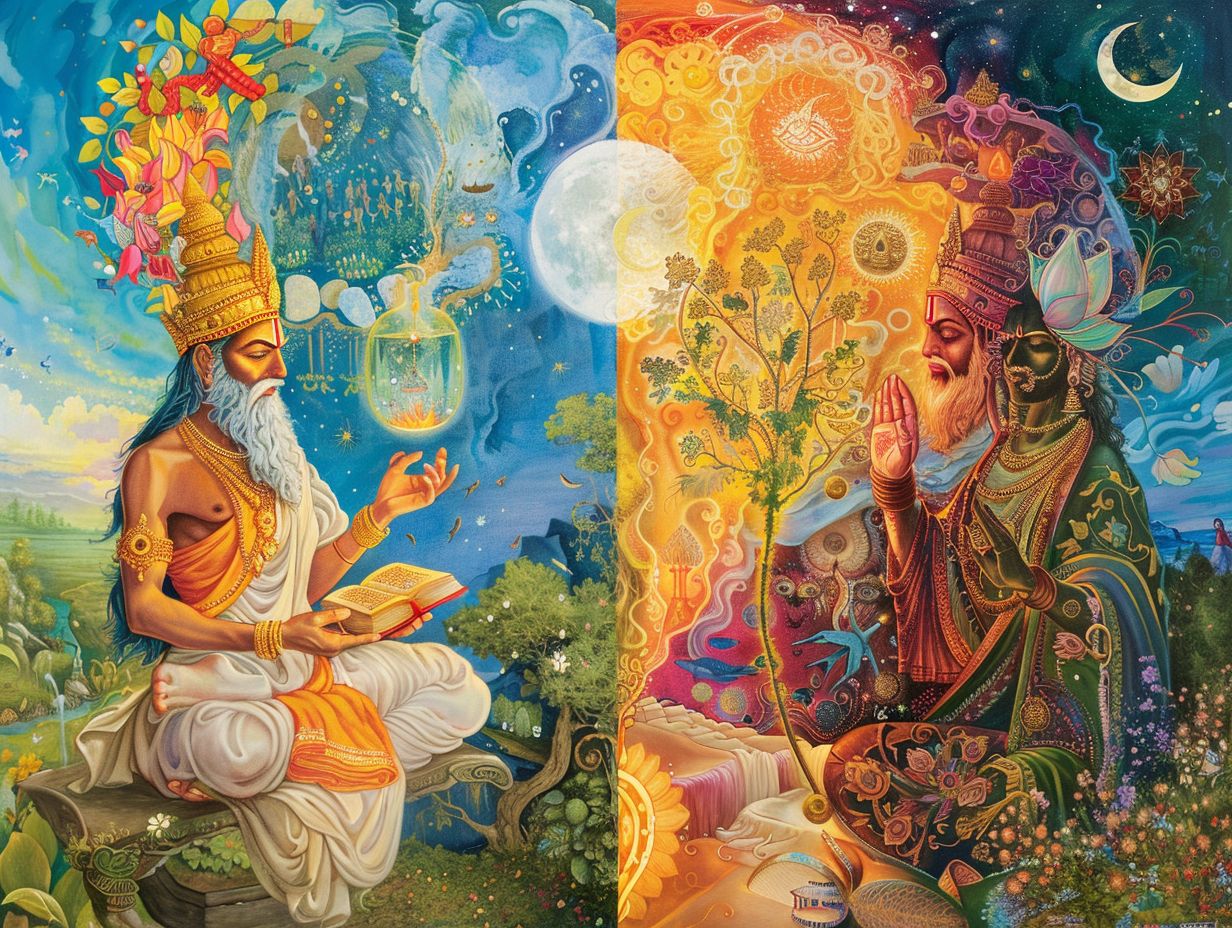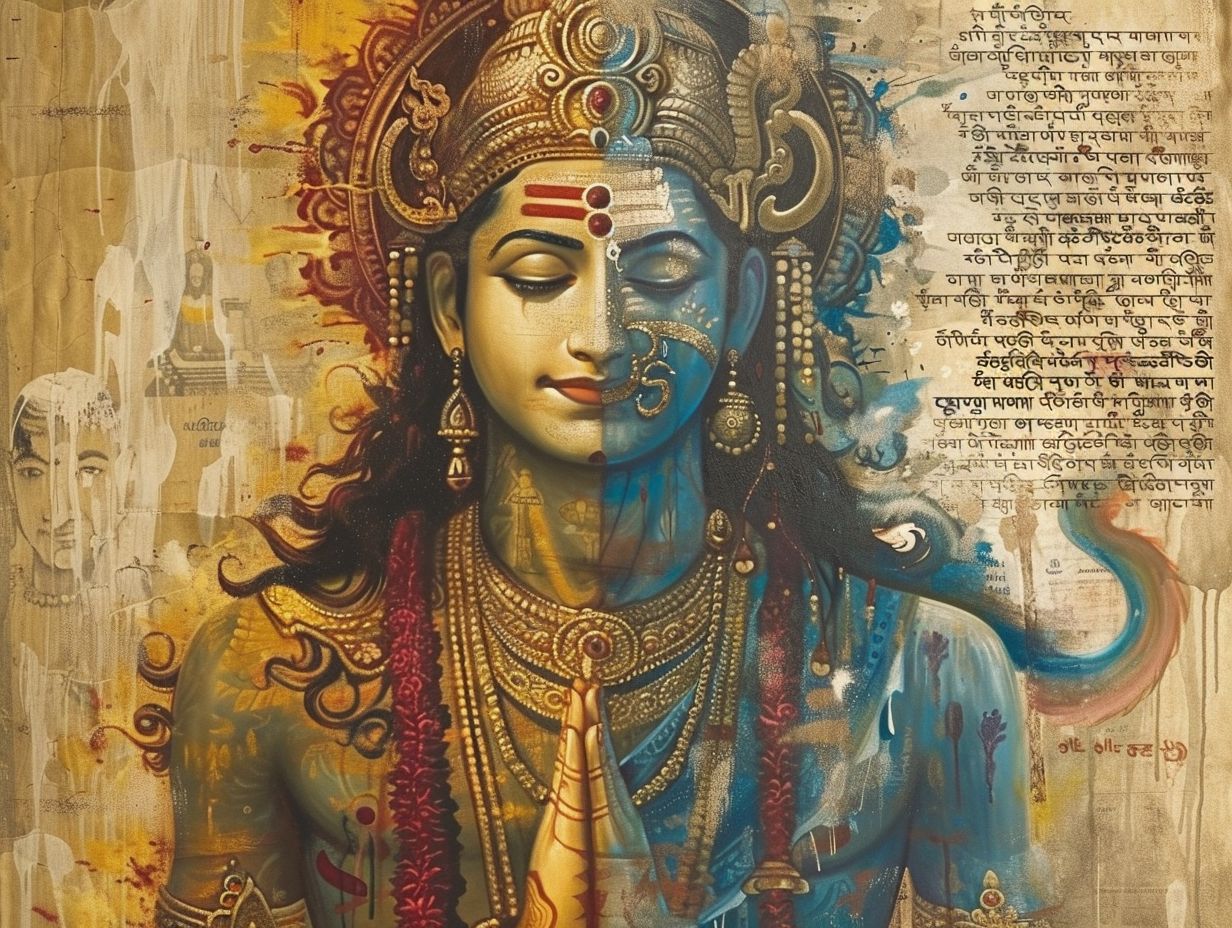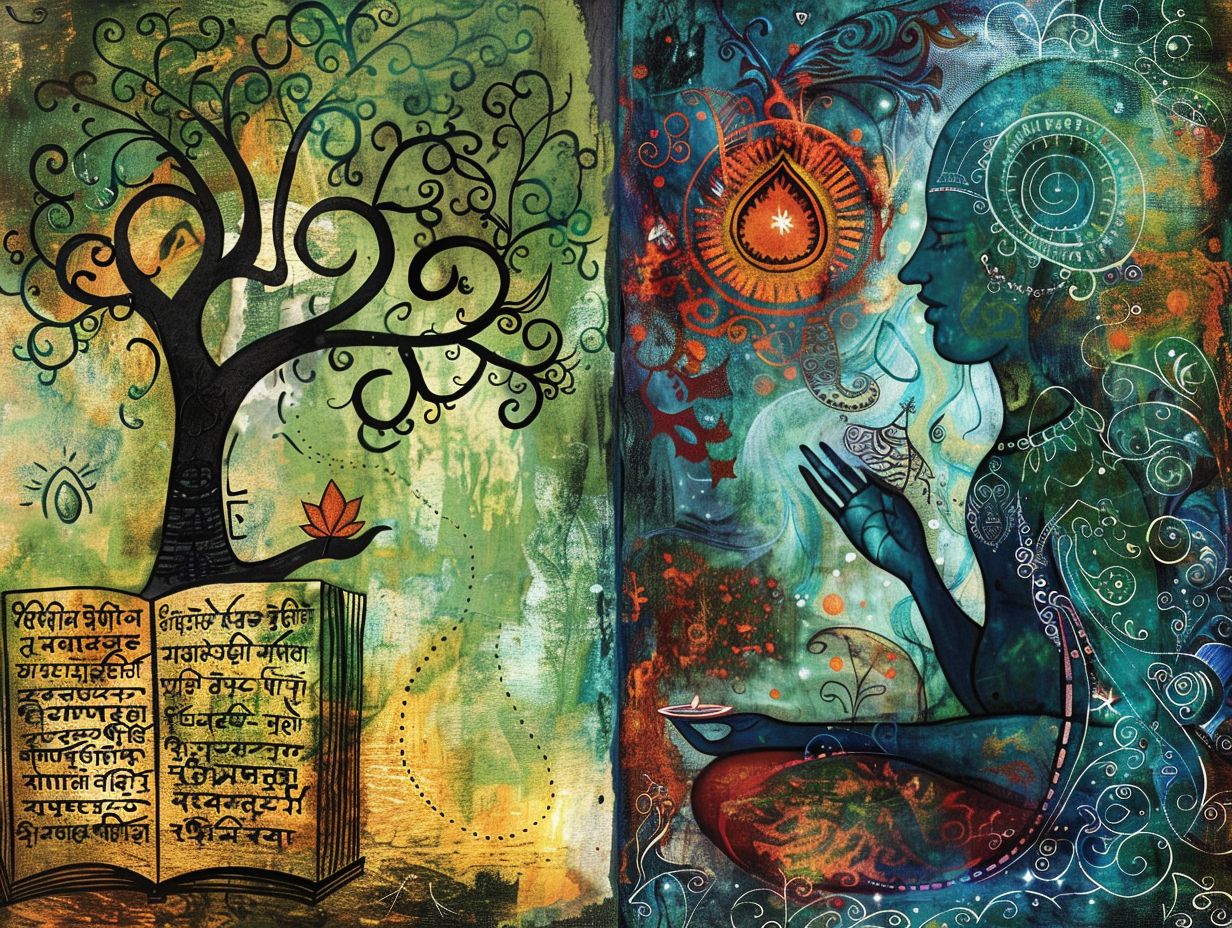Differences Between Astika and Nastika Philosophies
Astika and Nastika philosophies embody two distinct schools of thought within Indian philosophy, each characterized by its own unique beliefs and teachings.
Astika philosophies uphold the authority of sacred texts and affirm the existence of a divine being, while Nastika philosophies frequently challenge or reject these notions altogether.
The exploration of their key differences and similarities, alongside their broader implications on concepts such as karma, enlightenment, and moral conduct, will illuminate a comprehensive understanding of these fascinating philosophical frameworks.
What is Astika Philosophy?

The Astika philosophy represents a diverse array of schools within Indian philosophical traditions, predominantly linked to theistic beliefs that uphold the authority of revered sacred texts, including the Vedas, Upanishads, and Puranas.
This philosophy weaves together various philosophical systems such as Vedanta, Samkhya, Nyaya, and Mimamsa, creating a complex tapestry of metaphysics, epistemology, and ethics.
The Astika schools engage with profound existential questions and the fundamental nature of reality, all while advocating for spiritual practices designed to achieve liberation, or moksha, through moral conduct and dedicated adherence to dharma.
1. Astika Schools of Thought
The Astika schools of thought encompass notable philosophical systems, including Vedanta, Samkhya, Nyaya, and Mimamsa, each offering distinct perspectives on metaphysics, ethics, and epistemology within the expansive realm of Indian philosophy. These schools delve into foundational principles that tackle fundamental inquiries regarding existence and consciousness.
For example, Vedanta scrutinizes the concept of ultimate reality, articulating Brahman as the singular source of all existence while delineating the intricate relationship between the individual soul (Atman) and this boundless essence. In contrast, Samkhya presents a dualistic framework, elucidating the dynamic interplay between Purusha (consciousness) and Prakriti (matter), thereby outlining how these two elements shape human experience.
Nyaya distinguishes itself through its logical rigor, focusing on the processes of knowledge acquisition via precise reasoning and underscoring the significance of valid sources of knowledge (pramana). Meanwhile, Mimamsa, which is deeply rooted in ritual and duty, emphasizes an interpretive approach to Vedic texts, advocating for the centrality of dharma in daily life.
Through these varied lenses, these schools articulate a rich array of interpretations concerning God, reality, and the human condition, each contributing to the intricate tapestry of Indian philosophical discourse.
2. Core Beliefs of Astika Philosophy
The core beliefs of Astika philosophy center around the acceptance of scriptural authority, the principles of karma and dharma, and the pursuit of liberation (moksha) through ethical conduct and spiritual practices.
These foundational elements underscore the intrinsic relationship between one s actions and their consequences, highlighting the significance of living virtuously in accordance with dharma. Rituals within Astika traditions transcend mere formalities; they emerge as vital expressions of devotion and serve as pathways to connect with the divine.
Meditation, a pivotal practice, cultivates introspection and spiritual awakening, guiding practitioners toward a deeper understanding of the self and its fundamental relationship with the universe. Such beliefs form a moral framework that promotes ethical decision-making, aiding individuals in navigating existential dilemmas while offering profound insights into the nature of existence.
In this manner, Astika philosophy shapes a comprehensive approach to life s most profound questions.
What is Nastika Philosophy?
Nastika philosophy encompasses a diverse array of schools that question the authority of sacred scriptures and frequently adopt atheistic or agnostic viewpoints. This approach has made a substantial impact on the landscape of Indian philosophy, particularly through traditions such as Buddhism, Jainism, and Charvaka materialism.
Central to this philosophical perspective is an emphasis on subjective experience and rational inquiry, which takes precedence over rigid dogmas. By engaging with profound existential questions, Nastika philosophy offers a rich discourse that operates independently of theistic frameworks.
1. Nastika Schools of Thought
The Nastika schools of thought encompass significant traditions, including Charvaka, Buddhism, and Jainism, each offering distinct critiques of metaphysical concepts while prioritizing practical ethics over speculative philosophy.
These schools boldly challenge prevailing ideologies, interrogating the nature of reality, the self, and the various paths to liberation. For example, Charvaka champions a materialistic perspective that values sensory experience and harbors skepticism towards notions of an afterlife, urging individuals to pursue pleasure and well-being in the here and now.
In contrast, Buddhism presents the Four Noble Truths and the Eightfold Path as a comprehensive framework for ethical living and enlightenment, emphasizing the cessation of suffering through mindfulness and compassion. Jainism, with its strong focus on ahimsa (non-violence) and rigorous self-discipline, advocates for liberation through steadfast ethical conduct and a deep understanding of karma.
Together, these traditions weave a rich tapestry of philosophical thought that continues to shape moral frameworks, resonating far beyond their historical origins.
2. Core Beliefs of Nastika Philosophy

The core beliefs of Nastika philosophy often revolve around atheism, ethical conduct, and the pursuit of liberation, placing a strong emphasis on non-violence (ahimsa) and the significance of rational inquiry into the human experience.
This philosophical approach fundamentally challenges the reliance on divine authority and revelatory scriptures, advocating instead for a personal exploration of ethics and morality. Adherents of Nastika philosophy promote a deep understanding of karma and dharma, positing that ethical behavior arises as a personal choice rather than a duty imposed by supreme beings.
Meditation and various spiritual practices play a vital role in individual discovery and growth, facilitating self-realization and fostering inner peace. Such perspectives confront mainstream religious dogmas by championing a more individualized approach to spirituality, thereby significantly influencing contemporary philosophical discussions surrounding morality, the nature of existence, and the quest for knowledge.
Key Differences Between Astika and Nastika Philosophies
The fundamental distinctions between the Astika and Nastika philosophies are rooted in their respective stances on the authority of scriptures, their perspectives on the existence of God, and their approaches to ethics and the ultimate purpose of life.
These differences create unique worldviews that significantly influence the landscape of Indian philosophy.
1. Views on the Existence of God
Astika philosophy generally embraces theism, affirming the existence of God or a supreme reality, while Nastika philosophy often adopts atheistic positions, rejecting the notion of a divine being. This dichotomy creates a rich tapestry of philosophical discourse.
Proponents of Astika, particularly those influenced by the Vedas, advocate for a structured understanding of the universe grounded in divine order and dharma.
In contrast, the realm of Nastika thought features figures like Charvaka, who challenge such dogmas by promoting a materialistic worldview that prioritizes empirical evidence over spiritual claims. The historical contexts from which these philosophies emerged, ranging from the ancient debates within Indian schools like Nyaya and Vaisheshika to the counter-narratives provided by Jain and Buddhist thinkers, showcase profound inquiries into ethics and morality.
As a result, the ethical frameworks derived from each perspective significantly shape the followers’ conception of life, responsibility, and the very nature of existence itself.
2. Views on the Concept of Afterlife
Astika philosophies typically assert the existence of an afterlife, intricately linked to the principles of karma and reincarnation. In contrast, Nastika philosophies often question or outright reject these ideas, choosing instead to concentrate on the material realm of existence.
This fundamental divergence in beliefs significantly shapes the ethical conduct and quest for personal liberation among adherents of each philosophical system. For instance, those who align with Astika thought tend to evaluate their actions through the lens of their consequences in both this life and potential future incarnations, nurturing a profound sense of responsibility and moral obligation.
Conversely, practitioners of Nastika schools may endorse a more immediate, experiential approach to life, placing greater value on tangible experiences rather than metaphysical speculations. These differing perspectives not only affect individual choices and social norms but also contribute to broader metaphysical discussions concerning the nature of reality, existence, and the ultimate purpose of life.
By diving into these beliefs, one can uncover the ways in which various philosophical frameworks uniquely influence ethical behavior and the pursuit of personal freedom.
3. Views on the Role of Scriptures
The Astika philosophy firmly upholds the authority of sacred texts such as the Vedas and Upanishads, while the Nastika philosophy frequently challenges this authoritative stance, advocating for a belief system grounded in personal experience and rational inquiry.
This fundamental divergence significantly shapes their respective ethical frameworks and spiritual practices. Adherents of Astika traditions often seek guidance and legitimacy from these revered texts, viewing them as vessels of eternal truths and moral principles. Conversely, followers of Nastika thought place a premium on empirical evidence and logical reasoning, contending that ethical conduct should be determined by human experience rather than prescribed by ancient scriptures.
As a result, this dichotomy profoundly influences how each group interprets concepts of morality, duty, and self-realization, leading to distinct paths in spiritual development that arise from their contrasting epistemologies.
4. Views on the Importance of Rituals and Practices

Astika philosophies often underscore the importance of rituals and spiritual practices as vital components in the pursuit of liberation, while Nastika philosophies frequently regard these rituals as superfluous or irrelevant to the attainment of enlightenment.
This divergence in perspectives illuminates fundamental differences in the ways individuals navigate their spiritual journeys. For devotees of Astika traditions, rituals are essential tools that guide practitioners toward ethical conduct and personal transformation. These practices are perceived as vehicles for connecting with the divine and embodying moral virtues.
Conversely, proponents of Nastika philosophies contend that genuine enlightenment is rooted in personal introspection and direct experience, thereby rendering external practices unnecessary. This philosophical rift not only influences individual development but also shapes cultural practices, as each tradition outlines distinct pathways for those in search of meaning and understanding in their lives.
5. Views on the Ultimate Goal of Life
Astika philosophy generally perceives the ultimate goal of life as liberation (moksha), which is attained through a steadfast commitment to dharma and ethical living. In contrast, Nastika philosophy may articulate a different objective, placing greater emphasis on self-realization and subjective experience rather than spiritual liberation.
Both perspectives offer profound frameworks for comprehending how individuals navigate their lives towards an end goal that promises personal fulfillment and moral integrity. From the Astika perspective, ethical conduct is intrinsically intertwined with cosmic laws and the pursuit of righteousness, ultimately leading to liberation from the relentless cycle of birth and rebirth.
Conversely, followers of Nastika philosophies prioritize personal experiences and existential awareness, positing that individual truths and authenticity often take precedence over conventional ethical standards.
This divergence in philosophical thought invites stimulating debates regarding virtue, meaning, and the influence of societal norms on the quest for personal satisfaction and ethical behavior.
Similarities Between Astika and Nastika Philosophies
Despite their foundational differences, Astika and Nastika philosophies exhibit notable similarities, particularly in their acknowledgment of key concepts such as karma, ethics, and the pursuit of knowledge.
These elements are regarded as essential components of the human experience, reflecting a shared understanding of the complexities of existence.
1. Belief in the Concept of Karma
Both Astika and Nastika philosophies recognize karma as a foundational principle that governs moral philosophy and the consequences of actions within the human experience.
While both traditions acknowledge the intricate web of cause and effect woven by karma, they diverge in their interpretations of its implications for ethical conduct and decision-making. Astika philosophies tend to emphasize a cosmic order in which positive actions yield beneficial outcomes, thereby encouraging individuals to act virtuously. Conversely, Nastika thinkers adopt a more nuanced approach, often questioning the deterministic elements of karma and underscoring the significance of individual agency in shaping one s moral landscape.
These varying interpretations give rise to rich dialogues surrounding responsibility and the moral weight of decisions, ultimately influencing how practitioners navigate their life choices and ethical dilemmas.
2. Emphasis on Self-Realization and Enlightenment
Both the Astika and Nastika philosophies place a profound emphasis on self-realization and enlightenment, albeit through distinct paths and methodologies.
Astika traditions often encourage the study of sacred texts, immersing students in practices such as yoga and meditation that aim to deepen their understanding of both the self and the universe. These traditions employ various meditation techniques, including mindfulness and mantra repetition, which assist practitioners in cultivating awareness and connecting with their higher selves.
In contrast, Nastika perspectives, which may be rooted in philosophical inquiry and empirical investigation, emphasize skepticism and personal experience. This approach directs individuals towards existential questioning and fosters direct engagement with the world.
Both philosophies, rich in cultural significance and spiritual depth, offer seekers varied avenues for growth, ultimately guiding them toward transformative realizations about their existence.
3. Importance of Moral and Ethical Conduct

Astika and Nastika philosophies both highlight the profound importance of moral and ethical conduct, considering it vital to the pursuit of a meaningful life and the attainment of liberation or self-realization.
These philosophical frameworks offer distinct yet interrelated insights on dharma, emphasizing that ethical duties can vary significantly based on individual circumstances and societal roles. The Astika schools, encompassing traditions such as Vedanta and Samkhya, advocate for a strict adherence to Vedic scriptures, positing that ethical conduct is intricately linked to divine will and the cosmic order.
In contrast, Nastika philosophies exemplified by Buddhism and Jainism often dismiss Vedic authority, placing greater emphasis on individual moral responsibility and the cultivation of personal virtues like compassion and non-violence.
Collectively, these diverse perspectives illustrate that, although the paths may diverge, the commitment to ethical living remains a fundamental cornerstone of spiritual evolution and the quest for ultimate truth.
Frequently Asked Questions
1.
What are the main differences between Astika and Nastika philosophies?
Astika and Nastika are two opposing schools of thought in Hindu philosophy. Astika refers to those schools that accept the authority of the Vedas, while Nastika refers to those that reject it. This fundamental difference influences their beliefs and practices in many ways.
2.
How do Astika and Nastika philosophies differ in terms of their beliefs?
Astika philosophies, such as Samkhya and Yoga, believe in the existence of a supreme being or God, the concept of karma and reincarnation, and the ultimate goal of achieving liberation or moksha. Nastika philosophies, such as Buddhism and Jainism, reject the idea of a supreme being, believe in the concept of impermanence and reject the idea of a permanent self or soul.
3.
What are the main differences in the practices of Astika and Nastika philosophies?
Astika philosophies focus on ritualistic practices, such as yajnas and sacrifices, and the study of the Vedas as a means to attain moksha. Nastika philosophies, on the other hand, emphasize meditation, ethical conduct, and the cultivation of wisdom as the path to liberation.
4.
How do Astika and Nastika philosophies differ in their views on the nature of reality?
Astika philosophies see the world as ultimately real and seek to understand its true nature through the study of the Vedas. Nastika philosophies, however, view the world as an illusion and seek to transcend it through the practice of detachment and non-attachment.
5.
What are the main differences between the schools of Hinduism that fall under the Astika category?
The schools of Astika philosophy include six main schools: Nyaya, Vaisheshika, Samkhya, Yoga, Mimamsa, and Vedanta. These schools have distinct beliefs and practices, but they all accept the authority of the Vedas and the existence of a supreme being.
6.
How does the concept of liberation differ between Astika and Nastika philosophies?
Astika philosophies believe that liberation or moksha is achieved by realizing the true nature of the self and the universe through the study of the Vedas. Nastika philosophies, on the other hand, see liberation as the end of suffering and attachment through the practice of meditation and ethical conduct.
